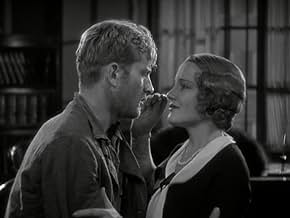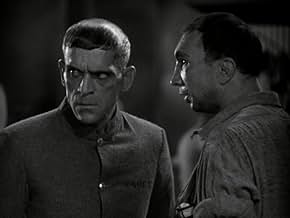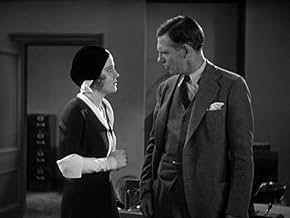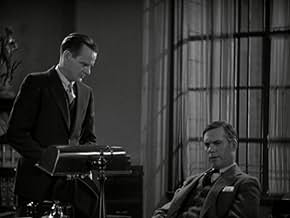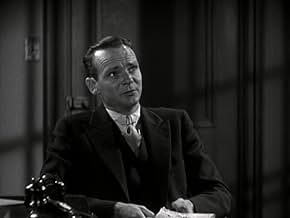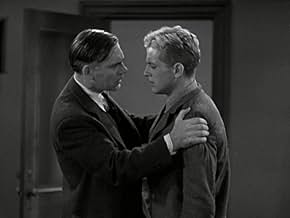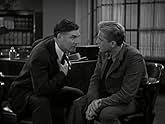AVALIAÇÃO DA IMDb
6,9/10
1,5 mil
SUA AVALIAÇÃO
Após uma tentativa frustrada de concorrer ao governo, o promotor Mark Brady é nomeado diretor da prisão estadual onde muitos dos criminosos que ele processou estão encarcerados.Após uma tentativa frustrada de concorrer ao governo, o promotor Mark Brady é nomeado diretor da prisão estadual onde muitos dos criminosos que ele processou estão encarcerados.Após uma tentativa frustrada de concorrer ao governo, o promotor Mark Brady é nomeado diretor da prisão estadual onde muitos dos criminosos que ele processou estão encarcerados.
- Direção
- Roteiristas
- Artistas
- Indicado a 1 Oscar
- 3 vitórias e 1 indicação no total
DeWitt Jennings
- Captain Gleason
- (as De Witt Jennings)
Paul Porcasi
- Tony Spelvin
- (as Paul Porcassi)
Richard Bishop
- Minor Role
- (não creditado)
Andy Devine
- Cluck - a Convict with knife
- (não creditado)
James Guilfoyle
- Detective Doran
- (não creditado)
Frank Hagney
- Prison Guard in Yard
- (não confirmado)
- (não creditado)
- Direção
- Roteiristas
- Elenco e equipe completos
- Produção, bilheteria e muito mais no IMDbPro
Avaliações em destaque
Robert Graham (Phillips Holmes) accidentally kills a man and is imprisoned for manslaughter. Some years later, the district attorney who - applying the criminal code verbatim - had got him into jail (Walter Huston) becomes prison warden and tries to rehabilitate him. That turns out to be hard because Graham has meanwhile learned another kind of criminal code: the values and standards that govern the behaviour of the prisoners. This is a well-intentioned film that is critical of the way the US prison system was run. It tells a good story and manages to generate a lot of suspense. The pacing is good, too - the thing gets never dull. There is even a bit of a romance, though this plays a rather minor role. I found the quality of the acting somewhat mixed. Huston, Holmes and Boris Karloff (who plays another prisoner) are doing very well, Constance Cummings (Huston's daughter and Holmes love interest) less so: At least in some scenes, she appeared rather wooden and stiff. What I found disappointing is the quality of the dialogue. Huston's default answer to almost anything he is told seems to be 'oh yeah?!' (a few years later - in 'It Happened One Night', 1934 - Clark Gable would make fun of dialogues that consisted of nothing but 'oh yeah?!'s). Whoever wrote the dialogues for 'The Criminal Code' did this otherwise good film no service.
Sometimes you seem to get into a position where you have to take your medicine for an even unintended actions. That is what happens to poor 20-year-old Bob Graham, and within 10 minutes into the movie, he's in the infinite world of prison, where he must learn yet another set of codes of the criminal sort. Creepy Ned Galloway (Boris Karloff just before his "Frankenstein" turn) takes a rather minor (at least early on) role and fills it with gusto (maybe its that creepy little haircut) in a claustrophobic cell. Later, he does the right thing for rehabilitated and soon-to-be-paroled (maybe) Graham, who does not violate the titular Criminal Code (since he's still a con).
James Whale wanted Karloff for his monster after seeing Boris in this flick, and after you see it, you'll know why.
BTW, who doesn't love a good prison movie yarn, and with Karloff in it, it rates a "9."
James Whale wanted Karloff for his monster after seeing Boris in this flick, and after you see it, you'll know why.
BTW, who doesn't love a good prison movie yarn, and with Karloff in it, it rates a "9."
10whpratt1
Boris Karloff appeared on the stage of the Belasco Theatre, New York City in the role of Galloway in a Martin Flavin stage play. It was a minor part, however, it was an important one: Galloway, the prison trusty who becomes a killer. On the strength of his performance, he was soon cast in the film version. During 1931-32, twenty-three of his films were released, an average of nearly one a month which included Frankenstein. Criminal Code was the big break Karloff was waiting for and he never gave up acting until the very end.
The lessons unlearned belong to Walter Huston's character, Mark Brady, but I'll get to that later.
Philip Holmes plays Robert Graham, a young man of twenty who gets into an altercation in a dance hall and ends up killing the other guy, someone he's never even met before. D.A. Mark Brady is not a man without compassion. He even states how, were he the defense attorney, he would get the boy off without serving a day. As a result, he sends him up for manslaughter rather than murder. However, that is still ten years, and six years into the sentence Graham is a man who is losing hope and his sanity.
In an odd twist of fate D.A. Mark Brady becomes warden of the prison, a place inhabited by many of the men he helped convict. The prison doctor comes to Brady with a request - let Graham be Brady's private driver for awhile, to get him out of the prison factory. Brady agrees. A few short months later and Graham is beginning to have a new lease in life. Plus, there is a complication - he is falling in love with Brady's daughter. However, an event soon occurs at the prison that threatens Graham's hope for a better future.
As for the lessons unlearned, the one quirky thing about this film is how D.A. turned prison warden Brady keeps saying "you've go to take things how they break", never realizing that in many cases - exhibit A being the case of inmate Robert Graham - Brady is in total control of how things break, in particular the fact that Robert Graham, a basically square kid, is an inmate in the first place. However, at least Brady is not a hypocrite, since he seems to be willing to take the good with the bad in his own life as well. A pretty complex character for an early 30's film.
Of course all classic movie fans are familiar with Walter Huston and his many abilities and roles. However, most people will not have heard of Philip Holmes. Partly this is because his early successes in film did not lead to better things as the 1930's progressed, and the rest of the reason is that many of his early successes occurred at Paramount, whose early films have been largely unseen for decades. This is worth checking out. The screenplay was nominated for an Oscar, and the performances are quite good.
Philip Holmes plays Robert Graham, a young man of twenty who gets into an altercation in a dance hall and ends up killing the other guy, someone he's never even met before. D.A. Mark Brady is not a man without compassion. He even states how, were he the defense attorney, he would get the boy off without serving a day. As a result, he sends him up for manslaughter rather than murder. However, that is still ten years, and six years into the sentence Graham is a man who is losing hope and his sanity.
In an odd twist of fate D.A. Mark Brady becomes warden of the prison, a place inhabited by many of the men he helped convict. The prison doctor comes to Brady with a request - let Graham be Brady's private driver for awhile, to get him out of the prison factory. Brady agrees. A few short months later and Graham is beginning to have a new lease in life. Plus, there is a complication - he is falling in love with Brady's daughter. However, an event soon occurs at the prison that threatens Graham's hope for a better future.
As for the lessons unlearned, the one quirky thing about this film is how D.A. turned prison warden Brady keeps saying "you've go to take things how they break", never realizing that in many cases - exhibit A being the case of inmate Robert Graham - Brady is in total control of how things break, in particular the fact that Robert Graham, a basically square kid, is an inmate in the first place. However, at least Brady is not a hypocrite, since he seems to be willing to take the good with the bad in his own life as well. A pretty complex character for an early 30's film.
Of course all classic movie fans are familiar with Walter Huston and his many abilities and roles. However, most people will not have heard of Philip Holmes. Partly this is because his early successes in film did not lead to better things as the 1930's progressed, and the rest of the reason is that many of his early successes occurred at Paramount, whose early films have been largely unseen for decades. This is worth checking out. The screenplay was nominated for an Oscar, and the performances are quite good.
The Criminal Code (1931) is often passed over when it comes to discussion of the films of Howard Hawks, but it's actually one of my favorites from him.
There are a lot of stagey aspects to be sure and the central love story is pretty boring, but there's just so much to love. The film experiments with sound, overlapping dialogue and using crowd noise as a plot element.
The two standout actors are Walter Huston and a pre-stardom Boris Karloff. Anytime either of them walks on screen, everyone else just evaporates. Huston does a great job making the audience love and despise his character. And Karloff is just mesmerizing as Galloway, a convict hell-bent on vengeance.
No masterpiece, but it is an early sign of Hawks' genius. And I would take it over Bringing Up Baby (1938) and His Girl Friday (1940) any day of the week.
There are a lot of stagey aspects to be sure and the central love story is pretty boring, but there's just so much to love. The film experiments with sound, overlapping dialogue and using crowd noise as a plot element.
The two standout actors are Walter Huston and a pre-stardom Boris Karloff. Anytime either of them walks on screen, everyone else just evaporates. Huston does a great job making the audience love and despise his character. And Karloff is just mesmerizing as Galloway, a convict hell-bent on vengeance.
No masterpiece, but it is an early sign of Hawks' genius. And I would take it over Bringing Up Baby (1938) and His Girl Friday (1940) any day of the week.
Você sabia?
- CuriosidadesThe prison yard sequence was shot at M-G-M, using the set originally built for "The Big House" (1930).
- Erros de gravaçãoPaul Porcasi's name is spelled "Porcassi" in the opening credits.
- Citações
Mark Brady: [to Graham] Tough luck, Bob, but that's the way they break sometimes. You got to take them the way they fall.
- Cenas durante ou pós-créditosThe film's credits do not say that Howard Hawks directed the film; instead, they say that the film is "A Howard Hawks Production."
- ConexõesAlternate-language version of El código penal (1931)
Principais escolhas
Faça login para avaliar e ver a lista de recomendações personalizadas
- How long is The Criminal Code?Fornecido pela Alexa
Detalhes
- Data de lançamento
- País de origem
- Idioma
- Também conhecido como
- The Criminal Code
- Locações de filme
- Empresa de produção
- Consulte mais créditos da empresa na IMDbPro
- Tempo de duração
- 1 h 37 min(97 min)
- Cor
Contribua para esta página
Sugerir uma alteração ou adicionar conteúdo ausente

